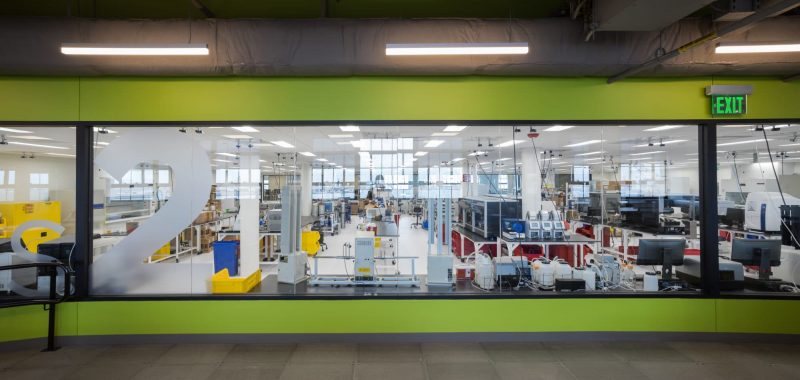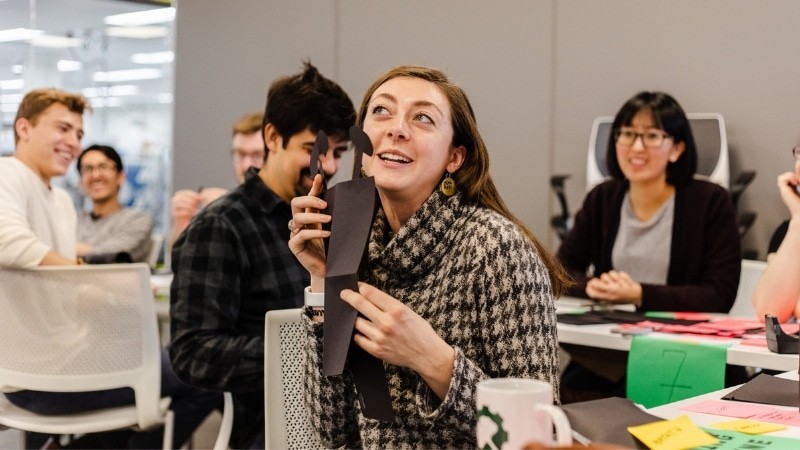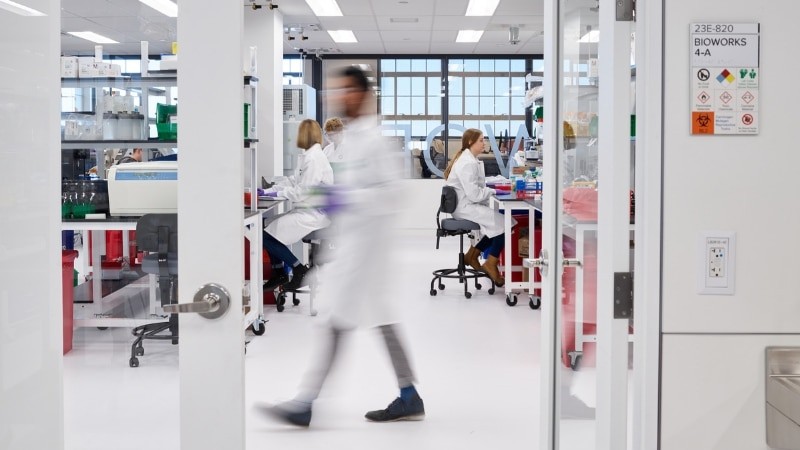Living medicines: Ginkgo’s machine to disrupt the pharma industry
Feb 20, 2019
Business is good for Ginkgo Bioworks, but the quality of the work is even better. Just ask Ena Cratsenburg, Ginkgo’s Chief Business Officer, whose job it is to find new markets for the company’s organism engineering technology. One of her goals is to give innovators the tools to create a new class of drug -- living medicines -- to help patients with subpar or no treatment options. I spoke with Ena recently about Ginkgo’s interest in pharmaceuticals, its new mammalian foundry, and the power of biology to do good in the world. Here’s our conversation, edited for brevity and clarity.
What’s it like at Ginkgo these days?
It’s exciting to be a part of Ginkgo and this bigger movement to pioneer bio-based products for the world. We're excited about the power of biology and the possibilities of bio-based products, and we see Ginkgo as a partner that provides a powerful enabling platform that can make that happen.Ginkgo is very committed to the mission of making biology easier to engineer, and there are certain aspects of the Ginkgo technology platform that are unique in the space today. I look around the synbio world today and I really believe Ginkgo has a one-of-a-kind toolkit that is head-and-shoulders above the rest.
Ginkgo is moving into the living medicines arena. What are we talking about when we say “living medicines”?
Living medicines, broadly speaking, are modified living biotherapeutics. The term “living” is very important because they’re designed to sense and respond to cues in the human body, then deliver optimal treatment to the specific needs of the patient.
Imagine a medicine that can treat untreatable diseases with minimal side effects. That's the potential we see with living medicine, which is to take advantage of all the amazing things that living cells can do.
Living medicine to me is essentially a form of personalized medicine. It provides treatment at exactly the right dosage, time, and place. It is designed to be smart so it is potentially more powerful and effective than conventional drugs today.
How is Ginkgo’s technology platform helping to realize living medicines?
We have built state-of-the art labs that we call foundries, and these foundries combine the latest automation and high-throughput equipment so that we can rapidly prototype genetically modified organisms for a variety of applications, ranging from industrial uses to consumer products and pharmaceuticals.Our first three foundries (Bioworks 1, 2, and 3) have been focused primarily on microbial systems. In late 2018 we opened our latest foundry, Bioworks4, and with this new foundry we now have a total of about 100,000 square feet of space that is dedicated completely to designing and printing DNA and engineering living cells. Bioworks4 enables us to apply our automated and high-throughput process to the engineering of the mammalian cells. And these mammalian cells are essential for pharmaceutical research and manufacturing. The opening of Bioworks4 gives us the ability to target more opportunities in a variety of novel therapies, whether it is engineered microbes or engineered cells or gene therapy. We can now use the foundries to rapidly design and develop high-quality drug candidates.
What does the living medicines portfolio look like at Ginkgo?
We are having a number of conversations with potential partners about developing drug candidates. One that I can share with you is a discovery collaboration with Synlogic, Inc. Synlogic is a company that is developing drug candidates within a specific class of living medicines that are engineered probiotics. These engineered probiotics are programmed with specific genes and molecular components to perform critical metabolic conversions in the gut that either replace or supplement physiological activities that are missing or damaged in patients. These programmed medicines have the potential to treat a range of conditions, including rare diseases, metabolic conditions, autoimmune and inflammatory diseases, and cancers.

Ena Cratsenburg talks about Ginkgo’s living medicines projects at SynBioBeta 2018.
Will pharmaceuticals become a major portion of Ginkgo’s business?
It will certainly be an important area for us. As far as what percentage of our projects or revenues, I think it is too early to tell. As we progress through the various stages of growth, we’ll probably see some changes up and down in terms of how much our portfolio comprises of one market or another. But it is an important part of our portfolio, and Bioworks4 is specifically dedicated to mammalian work. We are fully committed to working on pharma-related projects.
From an industry-wide standpoint, what specific enabling technologies is Ginkgo most excited about?
There's a bit related to hardware, there's a bit related to software, and there's a bit related to the the actual techniques, like genetic engineering. It's not one particular technology that we're excited about, it's the confluence of all these things. At Ginkgo, we believe automation and high-throughput approaches are critically important to harnessing the power of biology to enable us to bring new bio-based products to market. It gives us the ability to turn the crank and do more experiments with higher efficiency. When we do more, we learn more. And when we learn more, we have a better set of data that informs us about the next cycle of design. It’s that flywheel of design-build-test-learn that gives us the ability to harness the power of biology.Biology is an important and powerful technology, and we are just now beginning to scratch the surface on how to harness it. There's still a lot we don't know and so much biological diversity we have yet to explore. We need to be able to rapidly run through a lot of experiments, and explore the vast potential of the incredibly broad diversity of biological sequences for answers.
How does the synthetic biology industry as a whole -- and Ginkgo specifically -- measure its performance in terms of the engineering cycle?
It’s important for companies to understand how they are improving their own processes. For a company like Ginkgo, which is very much focused on improving our scale economies and experiment cost efficiency and speed, we do have developed metrics internally to track progress to allow us to continue to seek improvements.But I think it’ll be very challenging to find a standard set of metrics that works across the board for everybody. Efficiency and speed are important as they relate to the cost of generating output.
But at the end of the day, it only matters that you have a good product out on the market that is addressing the needs of society.
And so from our perspective, not only do we look at speed and efficiencies, but we also look at the quality of the output that we deliver.
Can you tell us about Ginkgo’s approach to partnering?
Partnerships exist because you’re trying to develop products that require expertise beyond what you or your company has. To leverage that, you really need to have an open dialogue and treat your partner as an extended member of your team. This open dialogue has to continue throughout the collaboration, not just during the honeymoon phase. It has to happen when times are tough, so that you can weather the storm.When deals are signed, there's a defined set of objectives underpinned by a technical plan that would generally guide the partnership throughout the collaboration. But rarely do projects progress precisely in the manner that's originally envisioned. A successful partnership recognizes that, and both parties have to be willing to make changes along the way to get to a good outcome.A good outcome may be different than the original outcome, but it could be better than what was originally envisioned. I've had that happen to me a number of times. So the types of partnerships that are most successful are those that recognize one plus one is greater than two, that each party has something to bring to the table, and that we’re willing to work collaboratively during the entire process to bring a product to market.

Ginkgo Bioworks has developed four foundries. Bioworks1, Bioworks2 (shown here), and Bioworks3 are focused on engineering microbes. Bioworks4, launched in October 2018, is designed to engineer mammalian cells and opens up new opportunities in pharmaceutical research and manufacturing. Photo courtesy Ginkgo Bioworks.
How involved does Ginkgo become in partners’ product development?
We get quite involved at every stage of product development. The types of involvement change, depending on the stage of the project and the specific targets that we're going after. But this is where the open dialogue comes in. Even with the early stages of designing the product, we really work collaboratively with our partner to understand the problem we’re trying to solve. Often, a company will engage us with a specific set of technical targets they want to hit based on an internal project goal in mind. Those technical targets may not incorporate other possibilities that we would think about. Given the broad range of projects Ginkgo has in different areas, we may look at things from different angles and see other possibilities that the partner doesn't think of initially.We generally start with the design specs for the technical project, then ask questions like how we get to intermediate milestones that get us to the final desired outcome, what are the different steps we want to take, how do we work with one another to leverage each other’s technical capabilities, what we know about the market and product, what downstream processes need to be performed, what type of regulatory protocols you need to adhere to, and what deployment factors we need to consider. There's input and feedback from both parties that would influence how the project plan will be designed. Again, open dialogue becomes a very important aspect of how we leverage each other's complementary skill sets to bring forth the synergy to ultimately deliver a successful product.
How do you think the synthetic biology industry compares to, say, the Silicon Valley tech industry?
There are a lot of parallels between those two markets. A lot of venture money goes into early stage emerging technologies, and you don't know if these companies are going to make it. But there is a community in the Silicon Valley tech industry that supports entrepreneurship, encourages innovative thinking, and provides the financial horsepower to create this ecosystem that enables entrepreneurs to thrive. And so a lot of what you see happening in software tech,, you also see happening in biotech, not just in Silicon Valley but also in Boston, San Diego, Seattle, and others.
Can we de-risk technical failure in biotech, pharma, and living medicines?
I think there is a paradigm shift that could happen in drug discovery and development, where early-stage development is much more rooted in high-quality design. Researchers today are really focusing on optimizing a small handful of targets because they simply don't have the tools to explore a broader range of possibilities. The scale and efficiencies of Ginkgo foundries can change that and usher in a new paradigm for drug discovery development because we actually can explore broad biological diversity and bring higher-quality, built-for-purpose candidates to clinic.Going to clinical trials - that’s what's expensive. Imagine making the entire industry more efficient by bringing a lot more, higher-quality drugs to clinic that can treat diseases, many of them no effective treatments today. What that means is that life-saving drugs can potentially be developed faster and cheaper. Now, that's really cool and something important we are very excited to contribute.
Can you speak to Ginkgo’s leadership in promoting transparency and social values within our industry?
I would say that for all of us in the synbio community, we're really excited about the new opportunities that genetic engineering is creating for many different industries. To the extent that we can bring more awareness to the great things that the technology can do and the benefits of GMO products, we are glad to do that.
And as far as social values such as promoting women leaders, being transparent in our communication, and supporting equal opportunities for everyone, those are things that are important to us and are part of our DNA.
We are made up of a community of people who believe in these values, and we love to share what we think and support others who feel the same. That's just who we are.Ultimately, what we want to do is to bring good products to market with innovative thinkers. We believe there's a lot of potential and excitement around using biology as a foundation for innovation, and we want to do what we can to realize it.

Creative resident Yasaman Sheri (not pictured) recently led Ginkgo scientists in a sketching workshop to explore future biosensor design. Photo courtesy Ginkgo Bioworks.
If readers take one thing from this conversation, what do you hope it will be?
I’d like people to see living medicines as a viable and important emerging modality in human therapeutics. There’s a lot of genetic engineering that needs to be done to enable living medicines to realize their potential, and we need a powerful toolkit to do that quickly and cost effectively. Bioworks4 and the capabilities we’ve built in Boston will enable partners to create new, high-quality living medicines to meet unmet patient needs today.


















